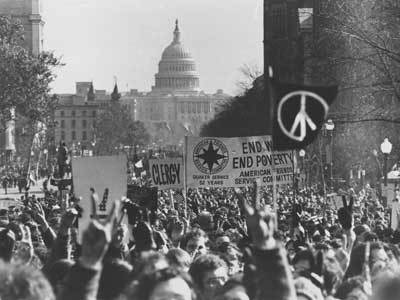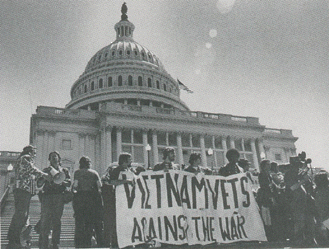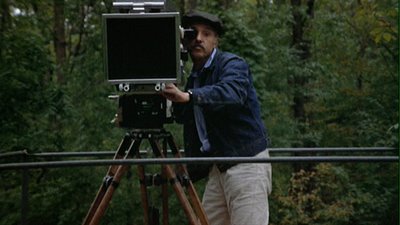According to news reports, police in Seattle are gearing up for possible May Day protests, as are authorities in Turkey and elsewhere around the world. Some of this happens every May Day (May 1), and wherever any march or protest occurs, we'll probably know about it either via traditional media or through Twitter, YouTube, Tumblr, emails, text messages, and other social media. It's almost impossible to hide anything from anyone nowadays, bringing to mind the old 1960s mantra "The Whole World is Watching" which was made famous (infamous?) at the 1968 Democratic Convention in Chicago (and in Haskell Wexler's iconic film, Medium Cool).
But one of the more memorable May Days in history went unreported to those of us who were defending the United States of America in Vietnam in May of 1971. That's more than a little ironic, especially for guys like me who served as "combat correspondents" and whose military job it was to report on what was going on with the troops and the war and all the rest.
But the reality was that our government didn't want us GIs to know that Washington D. C. police summarily arrested more than 12,000 of our fellow citizens on May Day 1971, the largest mass arrest in U.S. history! Nor did they want us to know that this came on the heels of an April 24 Vietnam War Out Now rally on the National Mall that drew more than 200,000 peaceful protesters
and after several days of protests and testimony by more than a few thousand Vietnam veterans in the nation's capitol as well.
The reason for this strange and somehow unfair situation was that the newspapers and radio broadcasts that reached us in Vietnam were controlled by Uncle Sam, and the military did not want us to know what was going down in the US of A. And while many of us counted on letters, newspapers from home, magazines -- and even teletype machines in the Information Office I worked in at U.S. Army headquarters in Long Binh -- none of those media reached us in time, and if/when they did, they were either muted, twisted, or spun by the military authorities.
In other words, "the whole world wasn't watching" what was happening on May Day 1971 -- those of us halfway around the world who were allegedly defending "freedom" in the jungles of Southeast Asia were clueless. Meanwhile, D.C. police were arresting just about anyone who looked like a demonstrator, including construction workers who had come out to support the government! Washington D.C.'s prisons weren't able to handle all the arrests, so an emergency detention center surrounded by an 8-foot-high fence was set up next to RFK Stadium. No food, water, or sanitary facilities were available to the detainees. Police helicopters also dropped tear gas on the Georgetown University athletic field where protesters had camped the night before. And President Richard Nixon was in San Clemente, where he refused to give Federal workers the day off, forcing them to navigate police lines and May Day roadblocks.
Eventually, the charges against the arrested protestors would be dropped, and the U.S. government would look as foolish as it had acted. We Vietnam soldiers didn't know that either, although we'd witnessed our own brand of U.S. foolishness in Vietnam.
So, what's the legacy of May Day 1971 in Vietnam? Embedded journalism? Weapons of mass destruction? WikiLeaks? Bradley (Chelsea) Manning and Edward Snowden?
Maybe it is really Medium Cool because in the film, Wexle mixes documentary footage of a significant historical moment (Chicago 1968) to expose the media's role in perpetuating the very events he's shooting. In effect, he implicates the camera and the viewer -- stressing that reality has consequences for which witnesses/viewers/audiences should be held accountable. Medium Cool contends that the camera can be used as a powerful weapon to shape society as it shows us the theatricality of American reality in an age increasingly negotiated by television.
Sadly, that's a critique we never got in Vietnam, and one we seem to have forgotten everywhere else.



